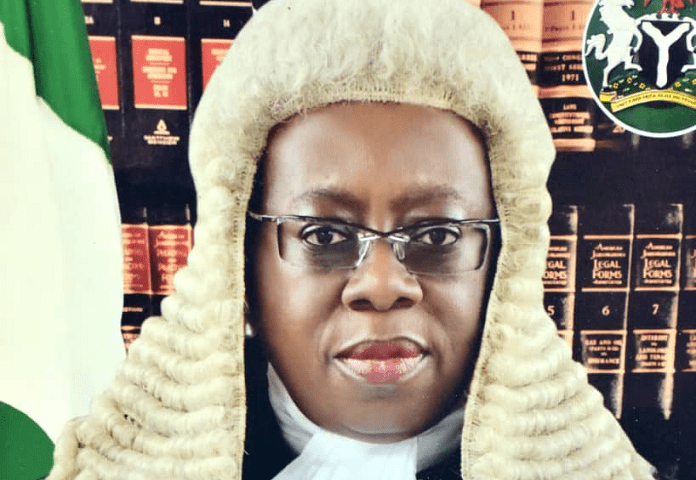Hon. Justice Kudirat Motonmori Olatokunbo Kekere-Ekun, the fifth and youngest female to be appointed as a Justice of the Supreme Court of Nigeria, was born in London, the United Kingdom on 7th May 1958.
Her parents were both indigenes of Lagos State, Nigeria. She is the eldest of eleven siblings from both parents. Her father, Alhaji Senator H.A.B. Fasinro, OFR, LL.D, was a fervent Muslim and a very dedicated family man of noble lineage.
He belonged to at least three Royal Families in Lagos. He was a legal practitioner and very active in politics. Throughout his career, he worked for many years as a Crown Counsel in the old Western Region of Nigeria. He also became the Town Clerk of Lagos City Council (similar to being the Mayor of Lagos).
In 1975, at the age of 56 years, he retired voluntarily from the civil service. He subsequently became a Senator of the Federal Republic of Nigeria in 1983. His tenure was however brought to an abrupt end with the overthrow of the Alhaji Shehu Shagari-led civilian government in a military coup in December 1983. He was also an author. He died at the age of 99 on 31st March 2019.
Her mother, Mrs. Winifred Layiwola Ogundimu (née Savage), is a devout Christian. She studied nursing in the UK, where she qualified as a Public Health Nurse before returning to Nigeria in December 1965. Upon her return to Nigeria, she built her career in the civil service of Lagos State and retired years later, at the age of 60. Mrs. Ogundimu is currently the head of a large and prominent Lagos family, the Savage Family.
Alhaji Senator H.A.B. Fasinro, OFR, LL.D, and Mrs. Winifred Layiwola Ogundimu both remarried when K.M.O. Kekere-Ekun was still young. K.M.O. Kekere-Ekun grew up in a polygamous home with her father, stepmothers, siblings, and other relations. One of her stepmothers, who greatly influenced her life, was a teacher. She was brought up in an extremely strict and disciplined environment at home, where she was taught lasting values such as hard work, integrity, contentment, and the ability to get on with most people and to cope with most situations. It was always a full house with extended family and other school children spending their holidays, to earn extra tutoring and a disciplined upbringing.
K.M.O. Kekere-Ekun was privileged with quality education. She attended private primary schools before proceeding in 1970 to Queen’s College, Lagos, which was the best Federal Government College for girls in the country at the time. She studied Law at the University of Lagos, Nigeria, from 1977 to 1980 and obtained her LL.B in 1980. Following this, she attended the Nigerian Law School from 1980 to 1981 and was called to the Nigerian Bar in July 1981.
From 1981 to 1982, she was engaged in the compulsory National Youth Service Corps (NYSC) at the Ministry of Justice, Benin City, Bendel State (now Edo State). Afterwards, she proceeded to the London School of Economics and Political Science (LSE) where she obtained a master’s degree in law in 1983.
After qualifying as a lawyer and obtaining a master’s degree in law from the London School of Economics and Political Science (LSE), she worked in private law practice for a few years. As a result of the toll of the demands of private practice on her domestic responsibilities, she decided to join the bench to be able to enjoy more predictable work hours. She applied and was appointed by the Lagos State Judiciary as a Senior Magistrate Grade II in December 1989. This marked the beginning of her career on the bench. She was subsequently appointed a Judge of the High Court of Lagos State on 19th July 1996. In September 2004, she was elevated to the Court of Appeal.
As a Justice of the Court of Appeal, she served in five different Divisions across the country. She was the pioneer Presiding Justice of the Makurdi Division of the Court of Appeal, and also served as the Presiding Justice of the Akure Division of the Court of Appeal before her elevation to the Supreme Court on 8th July 2013. She is currently a member of the Supreme Court Rules Committee and Chairman of the Supervisory Committee of the Litigation Department of the Court.
K.M.O. Kekere-Ekun served as Chairman of the Robbery and Firearms Tribunal, Zone II, Ikeja, Lagos, from November 1996 to May 1999, when the Tribunals were abolished. The constitution of the Tribunal included one police officer and one military officer. In the process, the police officer gained significant insight into the requirements for conducting effective criminal investigations and prosecutions. He was subsequently posted to the Police College (where recruits are trained) as a lecturer and was able to share a lot of what he had learned from his participation in the tribunal hearings.








